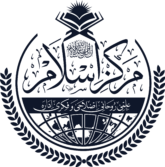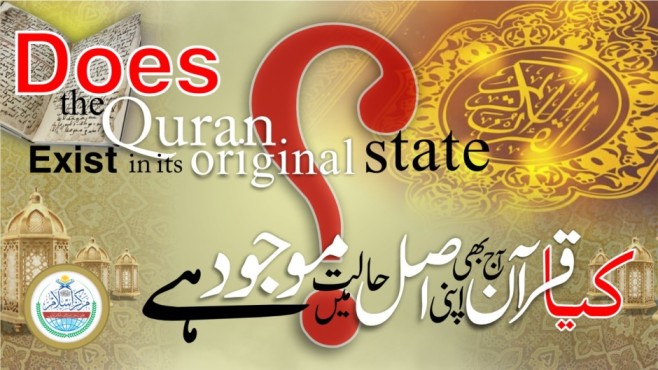The Holy Qur’an, the inspired book considered the eternal source of guidance for Muslims, has always been the focus of questions and devotion in human hearts. A question that often arises in the mind is, “Is the Qur’an still preserved in its original state?” The importance of this question increases because the Qur’an is the basis of the faith and belief of Muslims, and if any part of it had changed, it could have affected the fundamental principles of Islam.
But the promise of the Qur’an is that Allah Almighty has said that this book will be protected from all kinds of distortions and changes. So it is said in the Qur’an:
(Surah al-Hijr:9)
اِنَّا نَحْنُ نَزَّلْنَا الـذِّكْـرَ وَاِنَّا لَـهُ لَحَافِظُوْنَ
Translation: “Indeed We sent down this remembrance (Qur’an) and We are its guardians.”
This verse is very comprehensive in its explanation and the claim contained in it is unparalleled in its force. The Qur’an itself presents a challenge that whoever claims to protect this book will prove it in practice.
Table of Contents
The Challenge of Writing Preservation in Antiquity
Saving any talk or content is a very easy process in today’s modern age. We have the technology, the digital archives, and the capacity to store unlimited data. But if we turn the wheel of time and go back 1400 years, then it was a big challenge to preserve something in written and oral form. Humans have always preserved their important thoughts and sayings in different ways. Sometimes they are written down and preserved in book form, sometimes they are transmitted from generation to generation by reminding people orally. Sometimes, it is repeated in front of people so that they become rich in heart and mind. Some sayings are narrated in the form of a story so that their impact and memory last for a long time, or they are presented in the form of poetry because poetry is memorable because of its charm and relevance. It is still remembered.
Come, now we see whether all these methods were emphasized to protect the Holy Quran or not, and in which ways this holy book was preserved forever.
In the early days of Islam, the paper was extinct, and various methods were adopted to preserve the Qur’an. Oral memory was a very powerful tool among the Arabs. The first and foremost method of preserving the Qur’an was its oral memorization by the Prophet’s companions. The Companions not only remembered it themselves but also taught it to others. This system of oral protection continues to this day, and there are millions of Qur’an memorizers around the world, who have the entire Qur’an preserved in their chests.
The book form of the Qur’an and its editing
The process of preserving the Holy Qur’an in book form started from the time of the Prophet. Every verse of the Qur’an that was revealed, the Prophet (peace be upon him) would order his companions to write it down. Scribes of that time used to write it on various materials such as skins, bones, tree leaves and leather. However, the Qur’an was not compiled into a complete book at that time, as it was being revealed in parts during the time of the Prophet.
After being veiled from the outer world of the Prophet (PBUH), when Hazrat Abu Bakr Sidiqi (RA) came to rule, after the martyrdom of many custodians of the Qur’an in the Battle of Yamama, Hazrat Umar (RA) advised Hazrat Abu Bakr (RA) that the Qur’an should be written in book form. Should be collected in order to protect it. This was a very far-sighted step, which has great importance in the history of the Muslim Ummah.
Hazrat Abu Bakar (RA) chose Hazrat Zayd bin Sabit (RA) for this important responsibility, who collected various parts of the Qur’an from all the Companions and compiled it in the form of a Mushaf (manuscript). It was the first complete and comprehensive written version of the Qur’an.
The important role of Hazrat Usman (RA)
The reign of Hazrat Usman (RA) was a period of Islamic conquests, in which Islam had spread to distant regions. At that time, the Qur’an began to be read in different dialects in different regions, which was feared to create a possible difference. Hazrat Usman (RA) realized this and immediately took action. He formed a committee under the leadership of Hazrat Zayd bin Sabit (RA), who wrote the Qur’an in a standard manuscript according to the Qureshi dialect and sent its manuscripts to different regions. This initiative of Hazrat Usman (RA) is of great importance in the protection of the Qur’an, because since then there has been no difference in the recitation of the Qur’an and Muslims all over the world still read the same Qur’an.
The important role of Hazrat Ali (RA)
Hazrat Ali’s work on Arabic grammar is an important milestone in the evolution of Islamic sciences. You were an expert and deep knowledge of the Arabic language, and your insight and knowledge played a significant role in organizing and strengthening the structure of the language. Hazrat Ali formulated rules to regularize the Arabic language so that there is no mistake in the recitation of the Holy Quran and its correct understanding.
The importance of the Arabic language was increased by the Qur’an, and with the increase in the number of non-Arab Muslims, the need to regulate the structure of the language was keenly felt. Hazrat Ali (RA) realized this and instructed one of his disciples, Hazrat Abu Aswad al-Dawli (RA), to compile the rules of Arabic grammar. He guided them and provided the basis of the initial rules, which were further worked upon by the scholars of later times.
Hazrat Ali’s greatest achievement was that he laid the foundation of the basic principles of grammar and syntax to ensure the interpretation of the Qur’an and Hadith with accuracy and soundness of language. His work led to the formulation of the rules of the Arabic language, which later came to be known as “knowledge of Al-Nahaw” and “knowledge of Al-Sarf”.
Great combination of oral and written security
The preservation of the Qur’an depended not only on written manuscripts but also on oral memory. Along with Hazrat Usman’s (RA) manuscripts, there has always been a strong chain of custodians, who have been memorizing the Qur’an orally from generation to generation. This oral preservation system is so strong that even today there are Quran memorizers all over the world, who remember every letter of the Quran with complete accuracy.
These protective systems, both oral and written, further strengthen the protection of the Qur’an. If there is ever a discrepancy in a written prescription, the verbal guardians can correct the discrepancy immediately. Similarly, if there is an error in an oral memory, written texts can confirm it.
Recitation facility for foreigners
The mention of Hajjaj bin Yusuf occupies an important place in Islamic history, especially in regard to the editing of the Holy Qur’an and its explanation of the Arabic language. Hajjaj ibn Yusuf al-Saqafi (661-714 CE) was a powerful governor of the Banu Umayyad period, who not only achieved significant achievements on the political front but also did great things to make the Qur’an more comprehensible to non-Arab Muslims.
Hajjaj bin Yusuf noticed that when Islam was spreading in non-Arab areas, the foreign (non-Arab) Muslims were facing the complexities of the Arabic language and difficulties in reciting the Qur’an. During this period, the Arabic script did not include Arabs (zabar, zir, pesh) and dots, which made it difficult to pronounce and recite many words correctly. In order to solve this problem, Hajjaj bin Yusuf arranged to add harakas and Arabs (zabar, zir, pish) to the Qur’an so that non-Arab Muslims could easily read the Qur’an with the correct pronunciation.
To carry out this great work, Hajjaj bin Yusuf appointed Nasr bin Asim and Yahya bin Yamar, disciples of Imam Hasan Basri and well-known scholars. These scholars added points and gestures to the script of the Qur’an, due to which the recitation and understanding of the Qur’an became much easier. This work made the Qur’an easier to read and understand even for non-Arab Muslims, and reduced the possibility of any errors in its recitation.
Modern Investigations and Archaeology
In today’s era, modern scientific research and archaeologists have also confirmed that the written form of the Qur’an has not changed. The ancient copies of the Qur’an in various museums and libraries of the world, dating back to the time of Hazrat Uthman, are in perfect harmony with today’s modern copies. These manuscripts are proof that the Quran is still preserved in its original state.
Calligraphers and researchers of ancient writings have also confirmed that the Qur’an has not been altered or tampered with. With the help of modern digital techniques, the writing of ancient manuscripts has been analyzed and compared with modern manuscripts, finding no differences between the two.
The Quran’s inspired system of protection
This system of protecting the Holy Quran is not limited to mere human efforts. It is an inspired and divine protection, promised by Allah Almighty Himself. The Qur’an’s claim that “We are its protectors” is a claim that has been proven true in every era of history. Muslims have made the preservation of the Qur’an their top priority in every age, and even today there is only one copy of the Qur’an in any corner of the world, in which not a word has been changed or added.
It is a miracle that despite the passage of 1400 years, the Qur’an still exists in the same condition in which it was revealed to the Prophet. This is a great sign not only for Muslims but also for people around the world that the word of Allah is protected forever and the promise of its protection has been fulfilled.
Conclusion
The Holy Quran is still preserved in its original state, and this system of preservation is a great example of how no other book in human history has had such a level of preservation and miraculous survival. It is a great blessing for Muslims that they have the word of Allah in a safe state, and it is the core of their faith and belief. The promise made by Allah Almighty to protect the Qur’an is fulfilled even today and will remain fulfilled until the Day of Resurrection.




